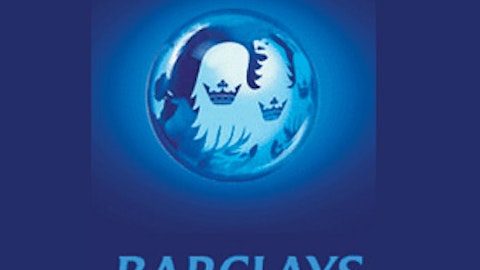
The divergence between traditional and emerging markets is borne out by latest International Monetary Fund projections, which puts U.S. growth at 1.9% in 2013, while eurozone GDP is set to dip 0.3%. Conversely, emerging markets are anticipated to expand 5.3% this year.
Bubbly activity in developing geographies can create large opportunities for many London-listed firms. Today, I am looking at Barclays PLC (ADR) (NYSE:BCS) and assessing whether its operations in these regions are likely to underpin solid earnings growth.
Bank lunges back into profit at start of 2013
Barclays PLC (ADR) (NYSE:BCS) announced in its first-quarter interims in April that the company had swung back into profit to the tune of 1.5 billion pounds, compared with a pre-tax loss of 525 million pounds in the same 2011 period. This was mainly due to a substantially reduced own credit charge of 251 million pounds against 2.6 billion pounds in January-March 2012.
The bank’s U.K. retail and business banking (RBB) segment has made an excellent start to 2013, with deposits, loans, and mortgages all rising in recent months. Profits here advanced 29% in January-March to 299 million pounds. Elsewhere, its Barclaycard division also continued to make headway, with profits rising 5% to 363 million pounds.
The company has extensive RBB operations in Africa, but its businesses here saw profit dive 39% on an annual basis in January-March to 81 million pounds, and reflects a 13% fall in income to 668 million pounds. This is also down significantly from 105 million pounds from the final three months of 2012.
Barclays PLC (ADR) (NYSE:BCS) has seen economic difficulties in the key market of South Africa lead to increased impairment charges, particularly among its mortgages portfolio there. Total credit impairment charges rose 8 million pounds in quarter one to 114 million pounds.
However, the bank is undertaking substantial work across its African RBB operations to boost business here. The firm — operating in 14 African countries, which account for half of the continent’s GDP — is in the process of launching new electronic channels and operating platforms to drive new business flows there. Last year, it introduced brand-new online and mobile channels, including Absa Online, Pingit, and Barclays PLC (ADR) (NYSE:BCS) Mobile.
In addition, the bank also continues to bolster its product catalog in the region and launched Premier, Barclays PLC (ADR) (NYSE:BCS) Direct, and Bancassurance last year. I believe that these steps should help the company bridge current difficulties there and help build long-term growth, even if its work in the U.K. will remain the cornerstone to the company’s fortunes.
So is Barclays a buy?
Earnings per share are expected to edge 3% higher to 36 pence, according to City experts, before taking off 22% in the following 12-month period to 43 pence.
Barclays PLC (ADR) (NYSE:BCS) has steadily rebuilt its dividend policy after taking the scythe to shareholder payouts in 2009 due to the fallout of Lehman Brothers’ collapse the year before. The firm increased the full-year dividend payout to 6 pence per share last year from 5.5 pence per share, and forecasters expect this to rise to 7.3 pence per share and 9.3 pence per share in 2013 and 2014. These carry yields of 2.5% and 3.2%, albeit still below a prospective average yield of 3.8% for the banking sector.
The bank was recently dealing on a P/E rating of 8.1 and 6.7 for 2013 and 2014, correspondingly, representing a chunky discount to a prospective earnings multiple of 11.5 for the entire banking sector. I believe that the firm’s earnings recovery makes it a decent pick among the baking sector, sweetened by improving dividend prospects.
The article Is Barclays an Exciting Emerging Market Play? originally appeared on Fool.com.
Fool contributor Royston Wild has no position in any stocks mentioned, and neither does The Motley Fool.
Copyright © 1995 – 2013 The Motley Fool, LLC. All rights reserved. The Motley Fool has a disclosure policy.

